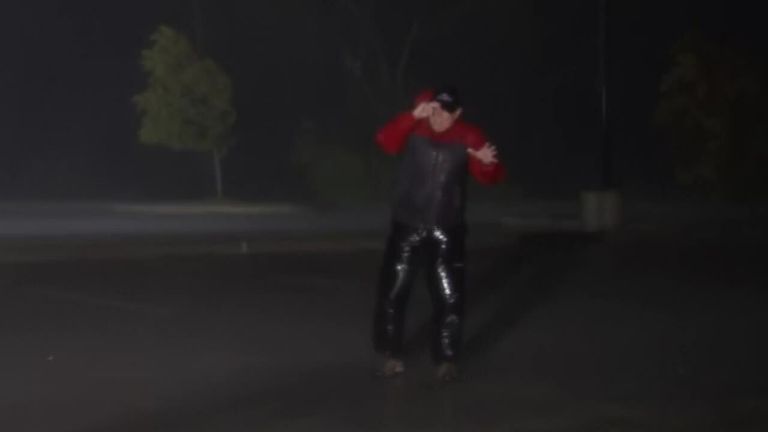Hurricane Laura makes landfall in southwestern Louisiana near Texas
Storm surges and winds are expected as Laura - the most powerful hurricane to strike the US this year - rips towards the coast.
Thursday 27 August 2020 22:32, UK
Residents in the path of Hurricane Laura have been urged to flee, with those refusing warned to prepare for the worst, amid warnings of "catastrophic" and "unsurvivable" storm surges.
Laura - the most powerful hurricane to strike the US so far this year - made landfall at 1am (local time) in southwestern Louisiana, east of the Texas border, as an "extremely dangerous" category four storm with 150mph winds, the National Hurricane Centre said.
In just 24 hours the storm grew nearly 90% in power, prompting forecasters to warn even stronger winds were possible that could tear apart buildings, fell trees and toss vehicles like toys - and push a massive wall of water 40 miles inland from the sea.
"To think that there would be a wall of water over two storeys high coming on shore is very difficult for most to conceive, but that is what is going to happen," said National Weather Service meteorologist Benjamin Schott.
"An unsurvivable storm surge with large and destructive waves will cause catastrophic damage," warned the NHC, adding it could be days before flood waters recede.
Around 620,000 people were ordered to leave their homes near the Texas-Louisiana state line, and around 100,000 households and businesses are without power in both states.
Temporary housing has been set up outside the surge zone for evacuated residents, and emergency teams are being strategically positioned, state and federal emergency management agencies said.
Several hours later, though weakening to a category two storm, Laura was still sustaining winds of 110mph while surging inland, the NHC said.
Tornado warnings have also been issued over southeastern Texas, Louisiana and southwestern Mississippi.
Video and photos on social media showing torrential rain battering the street lights of Lake Charles, a city in southwest Louisiana, and areas flooded closer to the coast.
However, some residents were reluctant to leave their properties before Laura struck.
In Vermilion Parish, the sheriff's office issued a stark warning to residents on its Facebook page: "If you choose to stay and we can't get to you, write your name, address, social security number and next of kin and put it a ziplock bag in your pocket."
At least 150 people refused to evacuate the coastal Louisiana parish of Cameron, where the hurricane made landfall - despite warnings it could be flooded.
Some of them are now calling for assistance, "but there ain't no way to get to them", said an official.
Forecasters said Gulf waters could rise 20ft along the coast of the low-lying parish.
Louisiana Governor John Bel Edwards said: "They're thinking Cameron Parish is going to look like an extension of the Gulf of Mexico for a couple of days."
He said the state was closing Interstate 10 from around the Atchafalaya Bridge outside of Lafayette, into part of Texas, because several stretches are expected to flood.
Port Arthur - an oil-refining city of 54,000 in Texas - was a ghost town, with just a couple of petrol stations and an off-licence open for business.
"People need their vodka," said Janaka Balasooriya, a cashier, who said he lived a few streets away and would ride out the storm at home.
Resident Eric Daw was heading to a shelter in San Antonio and echoed the concerns of many others about the ongoing coronavirus pandemic: "They say we are all supposed to socially distance now. But how am I supposed to socially distance in a shelter?"
In a radio interview on Wednesday night, Mr Edwards talked of the "apocalyptic" language that meteorologists had been using to describe the storm and its impact.
He said: "The language I've heard from the National Weather Service I've never heard before... They're sending the strongest possible message about how serious this storm is."
A category four hurricane can cause severe damage that may have lasting impacts for months in some places, and wide areas could be uninhabitable for weeks or months.
So far Hurricane Hanna, in July, and Hurricane Isaias, earlier this month, have impacted the States this season, as well as tropical storms Bertha, Cristobal, Fay and Marco - making Laura a record seventh named storm to hit the US.











